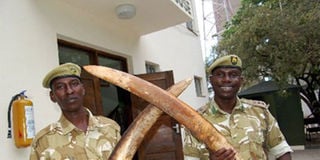Three Somalis among arrested elephant poachers

Two Kenya wildlife services[KWS] officers in Mombasa display two elephant tusks that they recovered from two suspects who they arrested in Shimba hills. The two tusks weighs 15kg each. Photo/LABAN WALLOGA
Three Somalis are among the latest people arrested in a crackdown on elephant poaching in the country.
Kenya Wildlife Service (KWS) rangers have linked them to a cartel behind poaching of the animal for its tusks in the Maasai Mara Game Reserve.
During an operation at Lemek in Narok South on Thursday, the rangers confiscated Sh700,000 which, they believe, was meant for the illegal trade.
KWS senior warden Kenneth ole Naisho said rangers arrested the three following a tip-off from the public, who suspected that the men were involved in illegal trade in ivory.
This was after a recent wave of poaching in the conservancy.
“We we found the money in gunny bags,” Mr Naisho said, adding that last month, they impounded 26.5 kilogrammes of elephant tusks at Olenkuluo.
During the incident, three people, among them a 10-year-old boy, were arrested after they were found ferrying the tusks on a motorcycle.
Mr Naishu said the poachers had changed tack in the illegal trade. They now use residents to kill the elephants, with minors and boda boda operators involved in ferrying the ivory to cartels and their agents.
“My officers are on high alert and will arrest and prosecute the culprits whenever they are found,” Mr Naishu said.
KWS, he further said, is pushing for stiffer penalties for those caught in the trade in a bid to curb the increased poaching of elephants.
“This is becoming a worrying poaching trend, which, if not controlled, will impact negatively on tourism and will increase the risk of wiping out the already endangered species in the country,” Mr Naishu said.
The killing of elephants in Narok results from their invasion of homes. The incursions have increased the human-wildlife conflict, mostly in Narok North District.
According to KWS statistics, there have been 9,000 human-wildlife conflict cases reported since 2001 in the region.
“About 5,000 cases involving elephants have been reported. The cases resulted in 48 deaths, 36 injuries and crop destruction, and pupils have been hindered from going to school in the area,” said Mr Naishu.
The senior warden blamed charcoal burning, opening of more farms and fragmentation of land for closing wildlife migratory routes, leading to destruction of the animal habitat. This has caused the human-wildlife conflict in the area, he added.
Statistics show that there are 37,000 elephants in the country with 3,000 in the Maasai Mara Game Reserve.
At the same time, a former Cabinet Minister G.G. Kariuki, has claimed the enactment of a law to enhance adequate compensation during human-wildlife conflicts was allegedly sabotaged, when he took it to a Parliament in 2005.
Mr Kariuki said the Bill would have increased compensation for death caused by wild animals from the current Sh200,000 to Sh10 million.




